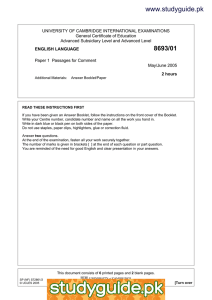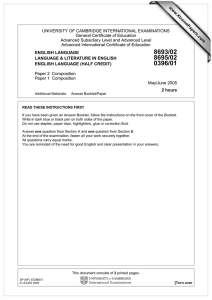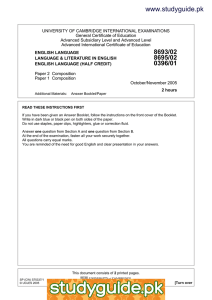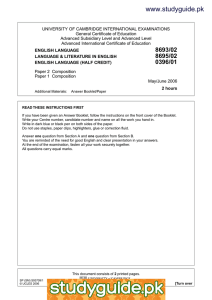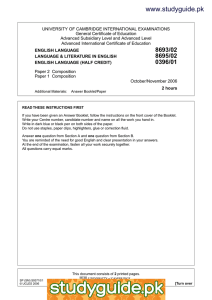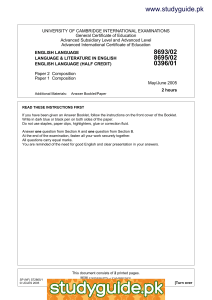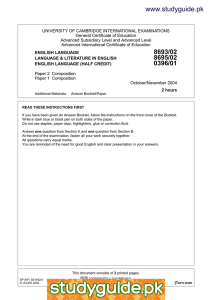UNIVERSITY OF CAMBRIDGE INTERNATIONAL EXAMINATIONS General Certificate of Education www.XtremePapers.com
advertisement
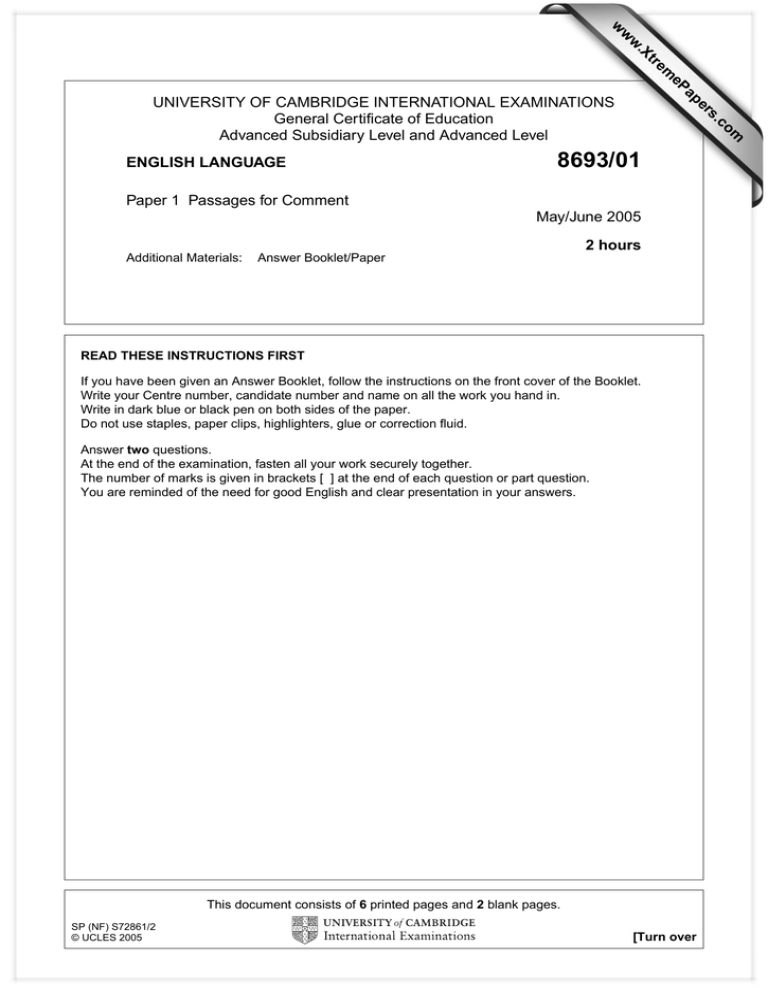
w w ap eP m e tr .X w om .c ENGLISH LANGUAGE s er UNIVERSITY OF CAMBRIDGE INTERNATIONAL EXAMINATIONS General Certificate of Education Advanced Subsidiary Level and Advanced Level 8693/01 Paper 1 Passages for Comment May/June 2005 2 hours Additional Materials: Answer Booklet/Paper READ THESE INSTRUCTIONS FIRST If you have been given an Answer Booklet, follow the instructions on the front cover of the Booklet. Write your Centre number, candidate number and name on all the work you hand in. Write in dark blue or black pen on both sides of the paper. Do not use staples, paper clips, highlighters, glue or correction fluid. Answer two questions. At the end of the examination, fasten all your work securely together. The number of marks is given in brackets [ ] at the end of each question or part question. You are reminded of the need for good English and clear presentation in your answers. This document consists of 6 printed pages and 2 blank pages. SP (NF) S72861/2 © UCLES 2005 [Turn over 2 Answer two questions 1 In the passage below the writer travels from England to visit her mother in West Africa. She becomes increasingly aware of cultural differences between her mother and herself. (a) Comment on the style and language of the passage. [15] (b) The mother later writes a letter to another relative discussing the relationship with her daughter and expressing concerns about her. Basing your answer closely on the extract, write the opening of the letter (between 120–150 words). [10] I have spent the last ten years trying to slim. I have tried the Slimfast juices that promised me all but delivered nothing. No sooner would I have gulped one down than I’d be hovering by the fridge. On days when the diet is on full steam, I starve myself all day and then binge on all manner of food at dawn, a bit like breaking one’s fast to make up for lost time. At times of utter desperation, I would rush out to the nearest supermarket and stock up on rye bread, cottage cheese and salads. Yes, especially the salads with the accompanying ‘oil-free’ dressings. I can hear you say, What about cream dressing? What about it? The only oil that sneaks into my system during this oil-free fast is palm oil. You know, it is meant to have real medicinal qualities, is rich in Vitamin A, improves skin texture and aids digestion. No, seriously, palm oil is not part of the diet, but occasionally one gets these urges to eat some proper food. That is not to say that one abandons the diet altogether – far from it! I mean, don’t they have half-time during football matches? Tennis players get a few minutes to catch their breath after every two games. And boxers get the odd few minutes to sit down on their tiny stool and work out how to knock their opponent out of the ring. It is in this manner, of giving myself the odd breather, that the rot sets in and I reach out for the egusi stew and … well, I am sure you would approve of the rest. When I travelled home to Accra at the height of one of these (stop-start, stopstart) slimming periods, I felt quite good about myself. As I descended the steps of the Boeing 747 into the familiar smells of hot and humid Accra, I could feel the sweat trickling down the back of my figure-hugging Monsoon outfit and felt all was well with the world. Mama was so pleased to see me, but she was horrified at how ‘thin’ I looked. For a few days I couldn’t quite work out the reason, I kept catching her eye looking me over. Then, one morning as I took breakfast of koko and koose to her room and sat on the edge of her bed to have our usual tête-à-tête (something we have always done to sort out real problems and share in our joys), she asked if everything was all right between me and my husband. Taken aback by the deep concern Mama had shown, I asked why. It all came tumbling out – how she had always known me to be big-boned and well-rounded, with child-bearing hips; a real woman and not one of these sticks hiding under ntama and kaba, parading around as though representing the image of new woman, but really looking quite ill. I tried to tell Mama that in my adopted culture, where I now live and work, it is considered quite beautiful to be thin. Upon which, I was quickly reprimanded and reminded that I might live in that culture, but home is home, and I mustn’t forget the good things I was taught about womanhood. In the early morning sunshine, I noticed Mama’s furrowed brow, and the realization came to me that not only are we a generation apart but we live in two different worlds. Then the lecture started: ‘You know, in our culture, at the onset of puberty, a girl is put in a room for a week and fattened for dipo. She eats, drinks and does nothing all day, and on the seventh day she is bathed and bedecked in precious beads and expensive gold jewellery and takes her place among her peer group, she’s paraded through the town square amid a lot of pomp and ceremony in celebration of her transition from girlhood into womanhood. And that my dear, is our culture. © UCLES 2005 8693/01/M/J/05 5 10 15 20 25 30 35 40 45 3 Her voice trailed off when she said, ‘And I hear the Effiks of Calabar have a similar culture of the fattening-rooms initiation ceremonies for girls before betrothal.’ My immediate reaction was to say to her, ‘Mama but I don’t live in Calabar, Dodowa or Somanya, I live in Oxford.’ One never argues with Mama, not if one has any sense. The final blow came when I excused myself to go jogging. I have found jogging along a sandy beach (something I used to enjoy as a child) a real calorie-burner and I was eager to take advantage of the cool morning sea-breeze. Mama gave me that look, which I know so well and recognized instinctively from my childhood, with its coded message: ‘I don’t approve.’ © UCLES 2005 8693/01/M/J/05 50 55 [Turn over 4 2 The passage below describes the writer’s memories of learning to drive. (a) Comment on the style and language of the passage. [15] (b) As part of their jobs, the instructor and the examiner had to provide brief notes summarising the writer’s driving performance. Basing your answer closely on the material in the extract, write both sets of notes (between 60 and 75 words for each report). [10] I dreaded my driving test. I have not forgotten the gloom and horror of my endless lessons, though they took place over 30 years ago. I was instructed by a man who, in some previous existence, must have been a Regimental SergeantMajor. Following him from his office to his car, I lost confidence even as a pedestrian. His kerb-drill, shoes gleaming one inch from the pavement’s edge, eyes swivelling right then left, was a fearsome spectacle. When he turned sharply into other streets he made strange gestures like hand-signals. Struggling behind him, I began colliding with people. As pedestrians, my instructor and I did not fraternise with each other and only when, slightly bruised, I caught up with him at the car itself did he address me. “This,” he said, “is the car.” The first lesson, I remember, was a very preliminary affair. Like dogs, we circled the waiting vehicle, while my instructor pointed out features of interest to me: windows, doors, lights, bumpers and so on. Then we came to the soul of the lesson: entering, and exiting from, the car. I got in, I got out, and in again and out again. I did this on the near side and on the off side. I also locked and unlocked these doors from inside and out. It was laborious work. As a mere passenger, I had never realised before what a complex business this getting in and out of a car should be. After an hour of it I was exhausted. “DSM next,” my instructor said as we marched back to his office. It sounded dangerous work to me, an acquired taste, and I looked forward to my next lesson with some apprehension. DSM the following week turned out to be door, seat and mirror. I repeated all I had performed with the doors, I manipulated endlessly, up and down, the windows and, like a dentist, I adjusted the seats to their extremities, sitting to attention next to my instructor one minute, then lying adjacent to him the next, and strapping myself in vigorously at his command. Between these exercises we allowed ourselves short rest periods during which we would discuss distilled water, tyres and other interesting matters. After four lessons, though I had mastered the milometer, speedometer, windscreen wipers, horn, oil-gauge and (rather unnecessarily I thought) the brakes; we still had not moved. The dust was gathering on us. We were road furniture, never traffic. I seemed to have no destination. We did eventually move the car backwards at first (it was hardly progress) and then forwards at last. Milk-floats overtook us, bicycles, old ladies and gentlemen from a previous century, but I was on my way. I had booked my test even before my first lesson and when the day eventually arrived I knew what to do. All I had suffered over those long weeks, all that agony, humiliation and academic pointlessness threaded over 20 lessons, I concentrated into 20 minutes and gave back. My examiner was a mild, moustached man. He did not know what he had done wrong. But I came to his help. As I was able to show, he did everything wrong. He got into the car wrong, he sat wrong, he was an altogether unskilful passenger. At every move I put him scrupulously right, bundling him in and out and up and down. Before we could start, I took it upon myself to prove that his car was worthy of the road. I checked everything from the boot to the bumpers. When asked to drive forwards, I did so – but only after violently adjusting the mirror, operating the window and giving a display of handsignals any conjuror would have envied. There was so © UCLES 2005 8693/01/M/J/05 5 10 15 20 25 30 35 40 45 5 much to do, I doubt whether we had time to move more than 30 yards along the crowded London streets over the next 30 minutes. But it was an aging experience. I had been well-drilled and it was my examiner who cracked. His hand was trembling as he signed my certificate. I was now equipped, I felt, to advance my career. © UCLES 2005 8693/01/M/J/05 50 [Turn over 6 3 The speech below comes from George Orwell’s novel Animal Farm and is delivered by Major, a pig, who shares his thoughts with other creatures. In the speech, Major explains how, from the animals’ point of view, humans are their enemies. (a) Basing your answer closely on the style of the passage, write the opening (between 120–150 words) of a speech in which a human being identifies a particular enemy or threat and urges action. [10] (b) Compare the style and language of your piece with those of the original extract. ‘Comrades, you have heard already about the strange dream that I had last night. But I will come to the dream later. I have something else to say first. I do not think, comrades, that I shall be with you for many months longer, and before I die I feel it my duty to pass on to you such wisdom as I have acquired. I have had a long life, I have had much time for thought as I lay alone in my stall, and I think I may say that I understand the nature of life on this earth as well as any animal now living. It is about this that I wish to speak to you. ‘Now, comrades, what is the nature of this life of ours? Let us face it: our lives are miserable, laborious, and short. We are born, we are given just so much food as will keep the breath in our bodies, and those of us who are capable of it are forced to work to the last atom of our strength; and the very instant that our usefulness has come to an end we are slaughtered with hideous cruelty. No animal in England knows the meaning of happiness or leisure after he is a year old. No animal in England is free. The life of an animal is misery and slavery: that is the plain truth. ‘But is this simply part of the order of nature? Is it because this land of ours is so poor that it cannot afford a decent life to those who dwell upon it? No, comrades, a thousand times no! The soil of England is fertile, its climate is good, it is capable of affording food in abundance to an enormously greater number of animals than now inhabit it. This single farm of ours would support a dozen horses, twenty cows, hundreds of sheep—and all of them living in a comfort and a dignity that are now almost beyond our imagining. Why then do we continue in this miserable condition? Because nearly the whole of the produce of our labour is stolen from us by human beings. There, comrades, is the answer to all our problems. It is summed up in a single word—Man. Man is the only real enemy we have. Remove Man from the scene, and the root cause of hunger and overwork is abolished for ever. ‘Is it not crystal clear, then, comrades, that all the evils of this life of ours spring from the tyranny of human beings? Only get rid of Man, and the produce of our labour would be our own. Almost overnight we could become rich and free. What then must we do? Why, work night and day, body and soul, for the overthrow of the human race! That is my message to you, comrades: Rebellion! I do not know when that Rebellion will come, it might be in a week or in a hundred years, but I know, as surely as I see this straw beneath my feet, that sooner or later justice will be done. Fix your eyes on that, comrades, throughout the short remainder of your lives! And above all, pass on this message of mine to those who come after you, so that future generations shall carry on the struggle until it is victorious. ‘And remember, comrades, your resolution must never falter. No argument must lead you astray. Never listen when they tell you that Man and the animals have a common interest, that the prosperity of the one is the prosperity of the others. It is all lies. Man serves the interests of no creature except himself. And among us animals let there be perfect unity, perfect comradeship in the struggle. All men are enemies. All animals are comrades.’ © UCLES 2005 8693/01/M/J/05 [15] 5 10 15 20 25 30 35 40 7 BLANK PAGE 8693/01/M/J/05 8 BLANK PAGE Copyright Acknowledgements: Question 1 Question 2 Question 3 Becky Ayebia Clarke; ‘Is Beauty in the Eye of the Beholder’; The Penguin Book of New Black Writing, ed Courttia Newland and Kadija Sesay, Penguin © Courttia Newland and Kadija Sesay 2000 © Individual authors 2000. Michael Holroyd; My Driving Test © The Independent, first published 15/06/03. ANIMAL FARM by George Orwell (Copyright © George Orwell, 1945) by permission of Bill Hamilton as the Literary Executor of the Late Sonia Brownell Orwell and Secker and Warburg Ltd. Every reasonable effort has been made to trace all copyright holders where the publishers (i.e. UCLES) are aware that third-party material has been reproduced. The publishers would be pleased to hear from anyone whose rights they have unwittingly infringed. University of Cambridge International Examinations is part of the University of Cambridge Local Examinations Syndicate (UCLES), which is itself a department of the University of Cambridge. 8693/01/M/J/05
